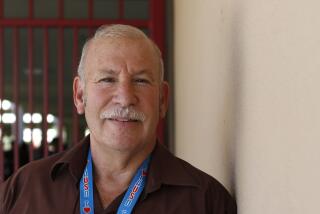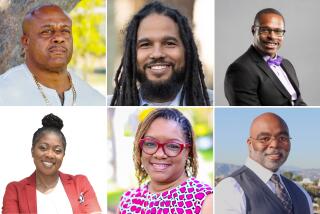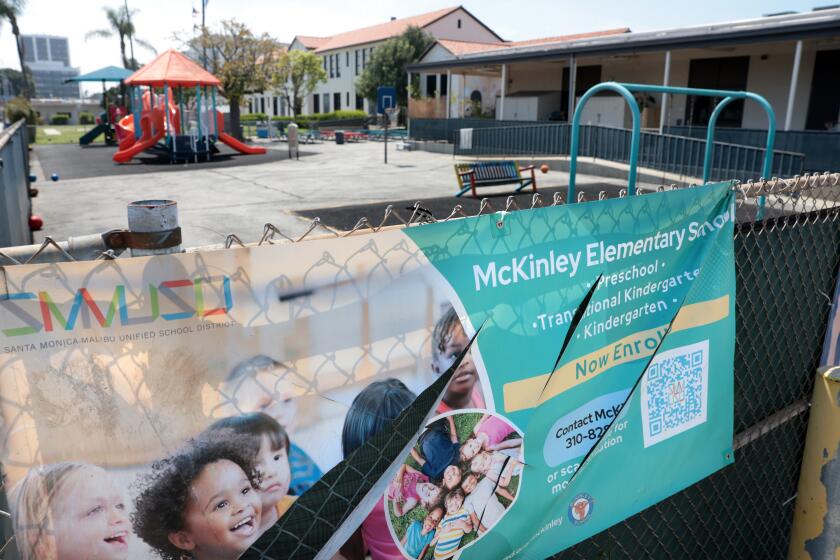William J. Johnston, superintendent who led LAUSD for 10 turbulent years, dies at 92
William J. Johnston took the helm of the Los Angeles school district in 1971 — in the wake of a five-week teachers’ strike and not long after Latino students had marched out of their Eastside schools, even as black leaders were in court demanding integration.
He stayed in the job for 10 years, presiding over a period of labor peace but ongoing political turbulence. No superintendent has lasted nearly as long since.
Johnston died Feb. 21 of skin cancer and congestive heart failure at his home in Redondo Beach at 92.
“Bill was superintendent during one of the most difficult periods of the school district,” said former school board member Howard Miller. “Bill was the consummate professional. He also represented the core of the values of the district and public education.”
When Johnston became schools chief, L.A. Unified was clinging to its self-image as a national model. It was a school system in which an insider — typically a white male — would rise to the top and answer mostly to its white middle-class families and an entrenched civic elite.
Johnston, a lifelong Republican, was perhaps the last superintendent from that mold, but he well understood that the ground was shifting under him. Enrollment was declining in the white middle-class Westside and west San Fernando Valley, and the number of Latino students was growing quickly in neighborhoods south and east of downtown.
It was important to Johnston to promote black and Latino leaders and to reach out to overlooked constituencies. Sid Thompson quickly discovered the latter when he became principal at Crenshaw High in the early 1970s.
He recalled being cornered by an unofficial and undisputed community leader, what Thompson called a “backyard lady.” Like the woman, Thompson was black, but that went only so far with her.
“She said: ‘I don’t know you, but you’ll have to answer to me, and if not I’ll go to Bill and you don’t want me to do that. We trust him.’ ”
Thompson added: “They weren’t trusting of too many people in those days.”
Thompson, who went on to become superintendent, also recalled Johnston’s direction after a bitter five-week teachers’ strike that ended shortly before he took charge.
“These are our teachers,” Johnston told principals. “You will do what you need to do in your school to hold it together.”
“He was charging us with using good judgment and not taking sides and making it an us-versus-them,” Thompson said.
There was no follow-up strike during Johnston’s tenure. A young teacher, Wayne Johnson, part of a militant faction, became frustrated at just how well the union was getting along with the schools chief.
“He kept the union at bay for 10 years,” said Johnson, who eventually became union president and led the next teachers’ strike in 1989. “He didn’t want another strike, but my perception of him was an attitude that, ‘We are in charge, and we are going to maintain our authority at the schools.’ ”
The 1970s were marked by litigation and strife. L.A. Unified resisted integrating the schools, lost in court, then fought internal and external battles over how to get it done. Anti-busing activists led a successful recall of board president Miller, after he said he would follow the law if the courts mandated busing.
Despite such turmoil, former senior district administrator Dan Isaacs called Johnston the last superintendent able to keep school board members from overstepping their roles by trying to micromanage the district. Miller and former board member Diane Watson recall an administrator who worked well with them, helped them reach consensus and then would follow their lead.
“He would call me in his office and say, ‘Coach, what do you think about this?’ ” said Watson, the first black woman to serve on the board. “I would talk to him about how the minority community felt [being] kept out of schools that were producing excellence.”
Busing opponents eventually defeated forced busing through litigation and a statewide ballot measure. What survived from that period is a voluntary integration program that has produced some of the district’s most well-regarded schools — even though the effort failed to achieve widespread integration or to stem white flight.
Johnston was born on March 12, 1926, in Alhambra, one of three boys raised by Genevieve and Ogden Johnston, a woodshop teacher at Roosevelt High School in Boyle Heights.
After Johnston graduated from Alhambra High in 1944, he immediately enlisted in the Army Air Corps, but the war ended before he could see action. He went to USC on the G.I. Bill, graduating in 1949 with a degree in mathematics and anthropology, followed soon after by a master’s degree in education from the same school.
In 1950, he married Oma Lee Blackwood, an Arkansas native who had been working in public relations for the Air Force. That same year, he started off as a math teacher at Gardena High School. He bought an empty lot in a new development in Redondo Beach and built the house where he’d live with his wife for the rest of their lives.
The principal made his young charge coach JV baseball over Johnston’s protests that he was unqualified. His boss once found the exhausted instructor fast asleep along the third base coaching box. Johnston was going to USC at night to take classes for his administrative credential and also was working weekends for a defense contractor making aluminum missile parts.
By 1957, Johnston was an adult-school principal at a campus with citizenship classes.
Johnston’s son, Michael, remembers that his father was always hesitant to go to one of their favorite Mexican restaurants because the owners would never let him pay for a meal — they were grateful that he’d helped so many family members become citizens.
In 1966 — by this time he’d earned his doctorate from UCLA — he was an upper-level administrator working with the PTA to take parents on bus tours of schools, showing them how badly the school system needed a construction bond. The measure passed.
After retiring as superintendent in 1981, Johnston chaired the state lottery commission, among many other civic posts. Gov. George Deukmejian selected Johnston in part because he’d opposed supporting schools through gambling proceeds. Having Johnston in charge of oversight would demonstrate to all that the effort was on the up-and-up.
Johnston co-wrote four books, largely because “he wanted others to recognize the greatness of those people that he had worked with,” Michael Johnston said. One was a history of the district’s Adopt-a-School program, which he started. Another was “Heroes and Teachers,” which profiled district employees who served with distinction in World War II.
Old school all the way, Johnston wrote hundreds of letters — then found someone to type them — to reporters and public officials, sharing his views, which included a disdain for charter schools. He also wrote 300 Christmas cards every year, tipped at least 50% and could explain to family members how the personal narrative of each server made them deserving of his generosity.
Johnston is survived by his son, Michael, his daughter, Kathy, their spouses and children, and his brother, Richard. His wife died in 2014.
Twitter: @howardblume
More to Read
Start your day right
Sign up for Essential California for news, features and recommendations from the L.A. Times and beyond in your inbox six days a week.
You may occasionally receive promotional content from the Los Angeles Times.







